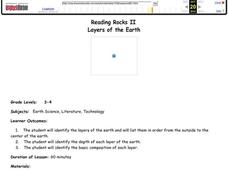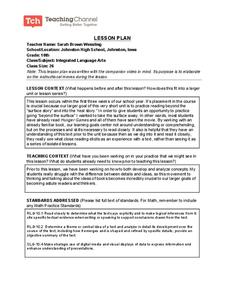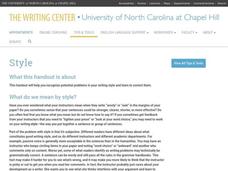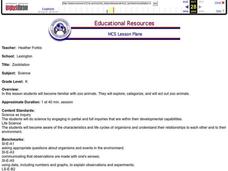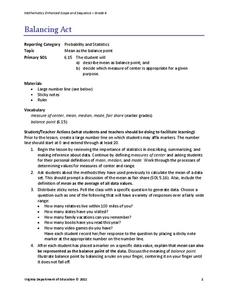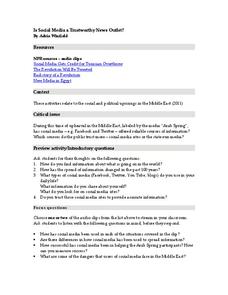Curated OER
Let's Call It Automatic
Students write whatever comes into their minds quickly and extend that strategy to art. They draw whatever ideas come to mind and students create in a stream of consciousness style. They listen to different types of music while drawing.
Curated OER
Underwater Descriptive Detectives
First graders utilize descriptive words to convey ideas in writing. After hearing the story, 'Rainbow Fish,' students create their own fish books. The books contain original writing and illustrations.
Curated OER
Something's Fishy
Students study fish habits and traits. In this marine life lesson, students complete four learning centers of a fish memory game, a fish habitat study, draw and glue fish craft activity, and a fish read-a-thon. Students complete their...
Curated OER
Layers of the Earth
Students identify the layers of the Earth and complete activities for the topic. In this Earth layers lesson, students chart their ideas about the Earth's layers and view a PowerPoint for the topic. Students view an apple to learn about...
Baylor College
Food for Kids
Immediately capture the attention of your class with the smell of freshly popped popcorn in the sixth activity of this series on the needs of living things. Young scientists first use their senses to make and record observations of...
Baylor College
Need or Want?
Even as adults it can be hard to distinguish needs from wants. Using pictures of common, everyday items, children make a pocket chart separating the objects they need from those that they want. Discuss their choices, explaining that...
Baylor College
Needs of Living Things: Post-Assessment
Assess your class's knowledge of the needs of living things with the final lesson in a series. Given a large piece of paper and coloring utensils, young scientists draw a picture of themselves and a plant or animal of their choosing,...
Curated OER
Comprehension: Create a Summary from a Narrative Text
If your class can sequence events in a story, are pretty good at retell, and can identify the main point, they are probably ready for reading comprehension through summarizing. This lesson provides a teacher's script that facilitates...
Curated OER
Summary and "The Fallacy of Success"
Suggested to accompany a class reading of The Great Gatsby, this plan begins with a discussion emphasizing the reputation of Vanderbilt University. Then, after the class has a working knowledge of the wealth associated with the school,...
Teaching Channel
Storyboard Lesson Plan
Good books are accessible through a variety of literary lenses. To consider how the same story can be seen in different lights, groups develop a storyboard for a movie teaser that would focus on one of six concepts found in Suzanne...
University of North Carolina
Style
Just like you choose your clothes to ensure they fit the occasion, you should choose your words deliberately while writing. Style, the main topic of one handout in a series on writing skills, involves choosing words carefully and paying...
Curated OER
Zoobilation
Youngsters become familiar with zoo animals. They sort them into categories, and choose an animal to act out. Two zoo centers are created in the classroom that have examples of the animals for the pupils to play with. Then, they choose...
Montana Natural History Center
Studying Grassland Ecosystems
At first glance, grassland ecosystems might seem dull and uninteresting, but once you start to explore it's amazing the things you'll find! Through this series of engaging lessons, activities, and experiments, elementary students examine...
EngageNY
Complex Numbers and Transformations
Your learners combine their knowledge of real and imaginary numbers and matrices in an activity containing thirty lessons, two assessments (mid-module and end module), and their corresponding rubrics. Centered on complex numbers and...
It's About Time
Where are the Volcanoes?
Middle school geologists map the volcanoes closest to themselves, learn about map distortion, and infer possible future volcano locations. A focus on latitude, longitude, and volcanoes beneath the ocean helps connect the lesson.
Virginia Department of Education
Balancing Act
How many different interpretations of the mean are there? Scholars place numbers on a number line and determine the mean. They interpret the mean as the average value and as the balance point.
Curated OER
Basic Features of a Civilization
Middle schoolers, in groups, identify items they would want to take with them to a deserted island. They present their ideas to the class and explain how they relate to the eight features of civilization. They consider this exercise in...
Curated OER
Fact or Fantasy Writing
First graders see that some written text is for pleasure and enjoyment while some is for relaying information. They get to experience both types during the lesson. They brainstorm ideas for a story about a new kid in school to write about.
Curated OER
Farmers and the Food Connection
Learners investigate the process of growing food. In this agricultural activity, students invite a farmer into their classroom to discuss how they grow and process food. Learners participate in learning centers which focus on farming.
Advocates for Human Rights
Civic Engagement and U.S. Immigration Policy
To conclude their study of immigration and human rights, class members create a civic engagement project centered on an issue of immigration and designed to influence US immigration policy. They examine examples of attempts to influence...
Shodor Education Foundation
Plop It!
Build upon and stack up data to get the complete picture. Using the applet, pupils build bar graphs. As the bar graph builds, the interactive graphically displays the mean, median, and mode. Learners finish by exploring the changes in...
Curated OER
Is Social Media a Trustworthy News Outlet?
Examine the role of social media in social and political uprisings. Pupils listen to NPR audio clips about social media and the Arab Spring and read an article that proposes the idea that revolution will not happen through social media....
University of Arizona
Identity Repair
In a detailed, creative writing task, potential poets analyze how race, identity, and society categorize and (mis)represent us. The learning begins with an imaginative anticipatory set where students describe unique situations that their...
American Museum of Natural History
Light Quest
Grab a partner and shed some light on light. A remote learning resource has scholars play a board game to answer trivia questions about light. They also read about how Einstein contributed to the understanding of light as both a wave and...


